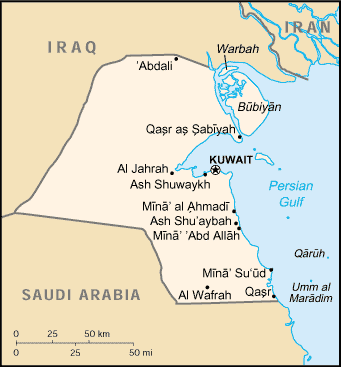| Revision as of 23:14, 3 November 2002 editScipius (talk | contribs)Extended confirmed users2,621 editsm table tweak← Previous edit | Revision as of 04:32, 6 December 2002 edit undoMark (talk | contribs)Extended confirmed users10,068 editsm Adding international calling codeNext edit → | ||
| Line 29: | Line 29: | ||
| <tr><td>] </td><td>]</td></tr> | <tr><td>] </td><td>]</td></tr> | ||
| <tr><td>]</td><td>.KW</td></tr> | <tr><td>]</td><td>.KW</td></tr> | ||
| <tr><td>]</td><td>965</td></tr> | |||
| </table> | </table> | ||
Revision as of 04:32, 6 December 2002
This article is about the country of Kuwait. For the capital city with the same name, see Kuwait City
The State of Kuwait is a small oil-rich monarchy on the coast of the Persian Gulf, enclosed by Saudi Arabia in the south and Iraq in the north.
| ||||
| National motto: None | ||||
| Official language | Arabic | |||
| Capital | Kuwait | |||
| Emir | Jabir | |||
| Prime minister | Saad | |||
| Area - Total - % water | Ranked 153rd 17,820 km² Negligible | |||
| Population
- Density | Ranked 141st
115/km² | |||
| Independence | June 19, 1961 | |||
| Currency | Dinar | |||
| Time zone | UTC +3 | |||
| National anthem | Al-Nasheed Al-Watani | |||
| Internet TLD | .KW | |||
| Calling Code | 965 | |||
History
Main article: History of Kuwait
Kuwait has been a part of the Abbasid empire from the 8th century, and was later incorporated in the Ottoman Empire (16th century), where it was eventually granted some degree of autonomy as a principality; the current royal family are descendants from these princes.
In 1899, growing British influence led to Kuwait becoming a British protectorate. This status ended with independence in 1961, by which time the discovery of oil had made the nation a wealthy one, attracting many immigrant laborers (which are not granted citizenship).
After being allied with Iraq during the Iran-Iraq War, it was occupied and annexed by Iraq in August 1990. An American-led alliance liberated the tiny nation.
Politics
Main article: Politics of Kuwait
Chief of state is the emir, a heriditary title. The emir appoints the prime minister, which is currently the emir's son, and crown prince. A council of ministers aids the prime minister in his task as head of government. The parliament, or Majlis al-Umma, consists of 50 members, who are chosen in elections held every four years. As Kuwaiti citizenship is very restricted, only 10% of the population is eligible to vote.
Governorates
Main article: Governorates of Kuwait
Kuwait is divided into 5 governorates (muhafazat):
Geography
Main article: Geography of Kuwait

Kuwait consists mostly of desert, with little altitude difference. The climate is dry and hot. On the north coast of the Persian Gulf, an number of islands is situated, largest of which is Bubiyan.
The major cities are the capital Kuwait, Salmiya (most inhabitants) and Hawalli.
Economy
Main article: Economy of Kuwait
Kuwait is a small, rich, relatively open economy with proved crude oil reserves of 94 billion barrels - 10% of world reserves. Petroleum accounts for nearly half of GDP, 90% of export revenues, and 75% of government income. Kuwait's climate limits agricultural development. Consequently, with the exception of fish, it depends almost wholly on food imports. About 75% of potable water must be distilled or imported. Higher oil prices put the FY99/00 budget into a $2 billion surplus. The FY00/01 budget covers only nine months because of a change in the fiscal year. The budget for FY01/02 envisioned higher expenditures for salaries, construction, and other general categories. Kuwait continues its discussions with foreign oil companies to develop fields in the northern part of the country.
Demographics
Main article: Demographics of Kuwait
About 80% of the Kuwaiti population is Arab; the non-Kuwaiti Arabs contain a large group of Palestinians. Other large groups of immigrants are made up by Indians and Pakistani, and Iranians.
The official language is Arabic, although English is generally understood. Some immigrants also speak their own local languages. About 85% of the Kuwait are muslims, mostly Sunni.